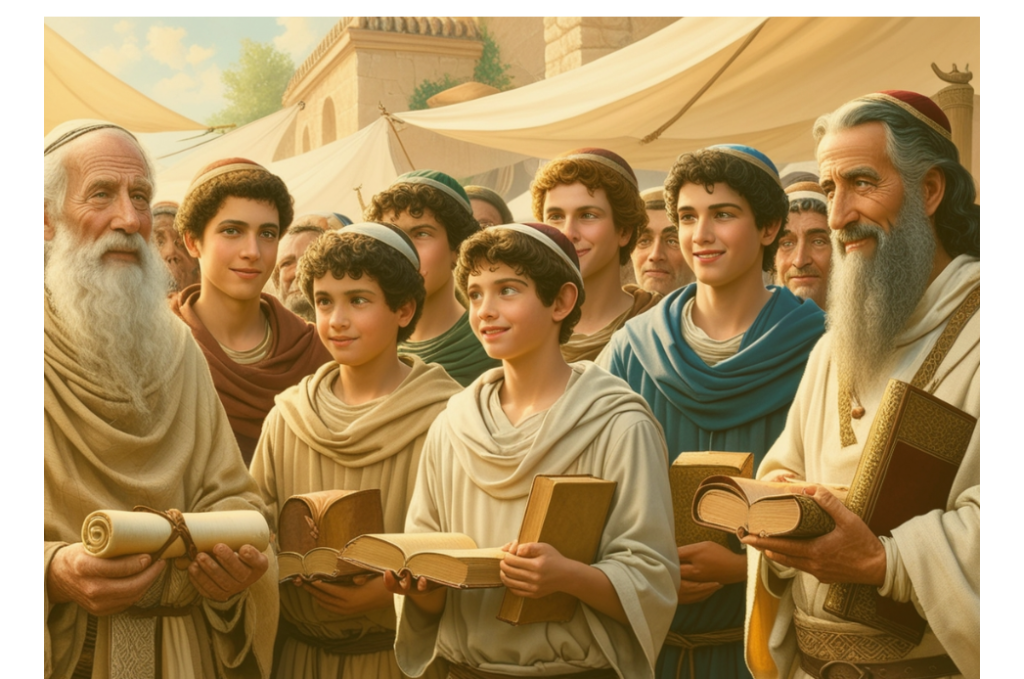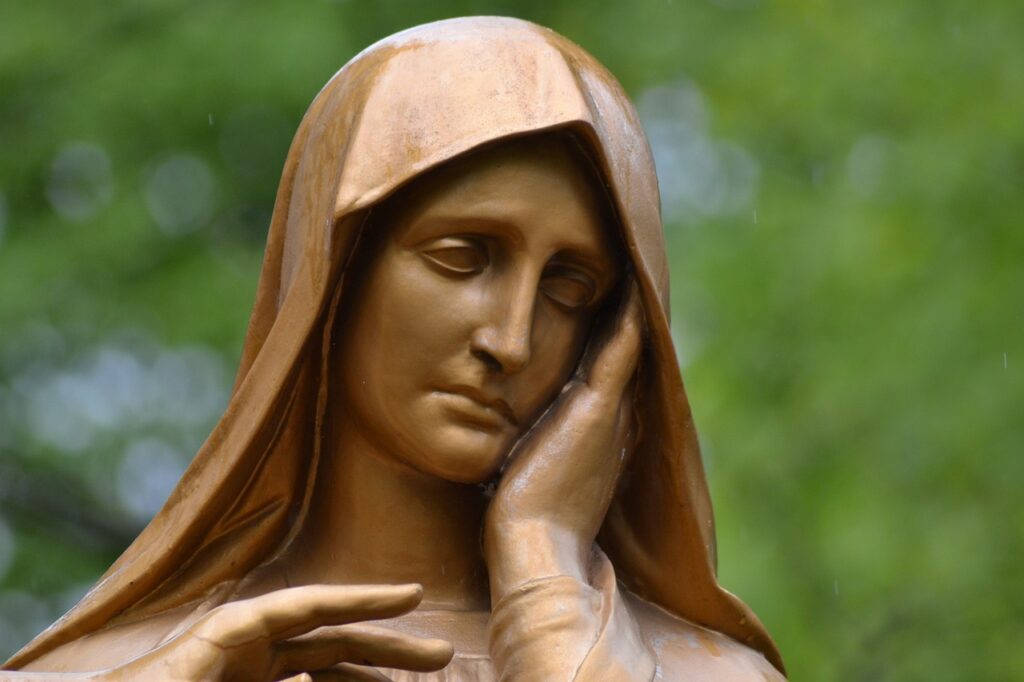Featured Art: Saint Catherine of Alexandria by Onorio Marinari c. 1670
The Claim
Many Protestant apologists argue that the Bible is self-interpreting and only references books that are divinely inspired. A key argument they put forth is that the Apocrypha (or Deuterocanonical books) are never explicitly quoted by Jesus or the New Testament authors. This absence, they claim, is a strong reason to reject these books as Scripture. If Jesus and the Apostles did not consider them authoritative enough to cite directly, then they should not be included in the biblical canon. However, this reasoning warrants closer examination, as the nature of biblical quotations and allusions is more complex than this claim suggests.
What Is The Apocrypha?
The term “Apocrypha” originally referred to a category of books that were not included in the biblical canon, often because they were considered hidden or esoteric in nature. Over time, however, the definition evolved, and during the Protestant Reformation, Martin Luther removed the Deuterocanonical books, which had been part of the Septuagint (LXX) and widely used in early Christianity. “The preface to the Apocrypha in the Geneva Bible claimed that while these books “were not received by a common consent to be read and expounded publicly in the Church”, and did not serve “to prove any point of Christian religion save in so much as they had the consent of the other scriptures called canonical to confirm the same”, nonetheless, “as books proceeding from godly men they were received to be read for the advancement and furtherance of the knowledge of history and for the instruction of godly manners.”Source
At the time, there had been no infallible Catholic declaration regarding the canon, meaning that opinions on these books were mixed. Some additional books, such as The Shepherd of Hermas or 1 Enoch, were valued by early Christians but were not considered canonical by the Catholic Church.
Luther grouped the seven Deuterocanonical books (Tobit, Judith, Wisdom, Sirach, Baruch, and 1 & 2 Maccabees) into the same category as other apocryphal writings. This has led some Protestants to mistakenly assume that Catholics also accept a broader range of apocryphal texts. However, the Catholic Church only recognizes the Deuterocanonical books as Scripture, not other apocryphal works like 1 Enoch or The Shepherd of Hermas.
What Do These Books Talk About?
The Deuterocanonical books were written primarily between 300 BCE and 100 CE, during the Second Temple period. They provide theological insights, wisdom literature, and historical narratives that bridge the gap between the Old and New Testaments.
These books discuss themes such as:
The wisdom of God (Wisdom of Solomon, Sirach)
The righteousness of following the law (Baruch, Tobit)
The struggle for Jewish identity under foreign rule (1 & 2 Maccabees)
Prayer for the dead and the afterlife (2 Maccabees 12:44-45)
Some Protestants argue for a “400 years of silence” theory, claiming that after Malachi, no inspired Scripture was written until the arrival of Christ.Funy enough, this “400 years of silence” is academically called the Greco-Roman period. Biblical scholar, Dan McClellan has a good video refuting Wesley Huff on this subject.
Does the Bible Ever Mention These Books?
Yes, the Bible does contain references to the Deuterocanonical books. While there may not always be direct quotations, many allusions and thematic parallels demonstrate their influence on New Testament authors.
Critics often demand a verbatim citation, yet many books in the Protestant Old Testament are also never explicitly quoted in the New Testament. The absence of a formulaic reference such as “As the prophet Jeremiah says…” does not mean a book was not considered authoritative. Many passages in the New Testament are clearly drawn from the Deuterocanonical books, even if they are not introduced with explicit attribution.
Examples are taken from two sources. Here and Here. In addition to Stuhlmacher’s references in Lee Martin McDonald’s The Formation of the Biblical Canon, Volume 1. Pg 310.
- Matt. 2:16 – Herod’s decree of slaying innocent children was prophesied in Wis. 11:7 – slaying the holy innocents.
- Matt. 7:16,20 – Jesus’ statement “you will know them by their fruits” follows Sirach 27:6 – the fruit discloses the cultivation.
- Matt. 9:36 – the people were “like sheep without a shepherd” is same as Judith 11:19 – sheep without a shepherd.
- Mark 12:20; – The Sadducees allude to the scenario found in Tobit 3:8—where a woman is widowed by seven successive husbands with no children.
- John 5:18 – Jesus claiming that God is His Father follows Wisdom 2:16.
- Luke 21:24 – Jesus’ usage of “fall by the edge of the sword” follows Sirach 28:18.
- Sirach 28:2: “Forgive your neighbor’s injustice, then when you pray your own sins will be forgiven.” Matthew 6:14-15: “If you forgive others their transgressions, your heavenly Father will forgive you.”
- Tobit 4:16 (15): “See thou never do to another what thou wouldst hate to have done to thee by another” (Douay). Matthew 7:12: “Do to others whatever you would have them do to you.”
- Wisdom 7:26: “For [wisdom] is the refulgence of eternal light, the spotless mirror of the power of God, the image of his goodness.” Hebrews 1:3: “[The Son] is the refulgence of his glory, the very imprint of his being, and who sustains all things by his mighty word.”
- Wisdom 9:13: “For what man knows God’s counsel, or who can conceive what the Lord intends?” Romans 11:34: “For who has known the mind of the Lord or who has been his counselor?”
Mark 10:19 appears to reference Sirach 4:1 alongside Exodus 20:12–16 and Deuteronomy 5:16–20, notably including “do not defraud”—a command not found in the Decalogue (Ten Commandments).
2 Timothy 2:19–20 seems to cite Sirach 17:26 in addition to Numbers 16:5.
Romans 1:24–32 likely draws from Wisdom 14:22–31, and Romans 5:12–21 echoes Wisdom 2:23–24.
1 Corinthians 2:9 cites a text as “it is written,” possibly referencing Ascension of Isaiah 11:34 or a lost Elijah Apocalypse based on Isaiah 64:3. Note that there is no exact Old Testament source for this “it is written” reference; therefore, if one insists that this phrase always introduces canonized Scripture, they must either accept this source as canonical or acknowledge that the New Testament occasionally draws from non-canonical traditions..
Jude 14 cites Enoch as a prophet and quotes almost directly 1 Enoch 1:9.
Hebrews 1:3 contains a direct citation of Wisdom 7:25–26.
James 4:5 appears to quote an unknown Scripture, possibly pseudepigraphal. McDonald Notes The Life of Adam and Eve and Apocalypse of Moses contain several notable parallels with New Testament writings.
- Revelation 8:2 refers to “the seven angels who stand before God,” echoing Tobit 12:15, where the angel Raphael claims to be one of them.
Furthermore, there’s also a plethora of others in the intertextual.bible with scholarly references at the bottom. A very good resource to have on hand.
Lastly, I’ll include the plainest reference to the Deuterocanincals which is in Hebrews 11:35. You can learn more about this and the protestant scholarly opinion in my other post, Hebrews 11:35 and the Maccabean Martyrs: An Apocryphal Quote.
What Does This Prove?
If citation alone were the standard for determining canonicity, then the Deuterocanonical books would fit seamlessly into the biblical canon.
They are referenced throughout Scripture and were part of the Septuagint, which was the Bible used by early Christians and even by Jesus Himself.
If we apply the same criteria that Protestants use for their canon, the Deuterocanonical books meet the standard just as well as, if not better than, some books in the Protestant Old Testament.
Furthermore, rejecting these books solely because they are not explicitly quoted in the New Testament ignores the fact that several books of the Protestant Old Testament—such as Esther, Song of Songs, Obadiah, Nahum, Zephaniah, and Ecclesiastes—are also never quoted in the New Testament. If absence of quotation were a valid argument for exclusion, then these books should also be questioned. However, since they remain in the Protestant canon, this standard is applied inconsistently when used to reject the Deuterocanon.
The available evidence strongly suggests that Jesus and the New Testament authors were aware of and respected the Deuterocanonical books, using them to teach theology, moral law, and eschatology. Their historical and doctrinal importance cannot be ignored, and their presence in the Septuagint further solidifies their significance in early Christianity.



